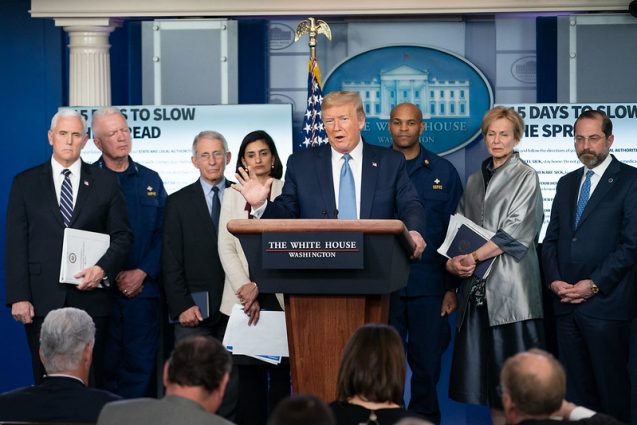Trump’s ‘Industry First, Science Last’ Agenda Is Costing Lives

Scientists are finally receiving some much-deserved praise from the Trump administration. At a recent briefing on the COVID-19 pandemic, administration officials hailed the “great American innovators” who are working tirelessly to develop a vaccine and treatments. President Trump vowed to do “everything we can” to accelerate research, and touted steps already taken to “slash red tape” to speed experimental drugs to market. But, like so much of what the president does, that mostly benefits industry. Meanwhile, government and independent researchers face major challenges due to the president’s ongoing war on science, which has significantly weakened their ability to respond to COVID-19 and other looming public health and environmental crises.
No one can fault the Trump administration for wanting to get treatments to COVID-19 sufferers quickly. But rushing to introduce untested, or only partially tested, drugs may benefit pharmaceutical companies more than anyone else. President Trump seemed to acknowledge the risk, but having already promised big pharma he would speed things up, he took this opportunity to deliver. He has yet to deliver for scientists.
In February, as COVID-19 was spreading around the globe, President Trump proposed to slash funding for the National Institute of Allergy and Infectious Disease by $430 million. Administration officials defended these cuts through March 10. Meanwhile, President Trump began promoting a $1 trillion stimulus package—which later grew to $2 trillion—and proposed large bailouts for the fossil fuel and other industries. For days, the president maintained that the economy was the priority, while scientists warned that the COVID-19 crisis was worsening. Even now, he remains disproportionately focused on big business, to the point that corporate executives have often been given more airtime in press briefings than health officials.
This is entirely “on-brand” for President Trump. For over three years, he has ignored scientists and undermined their research, often for the benefit of industry, with which his administration has unusually close ties.
The Silencing Science Tracker — a joint initiative of the Climate Science Legal Defense Fund and Columbia Law School’s Sabin Center for Climate Change Law — documents 277 federal government attempts to restrict scientific research and discussion since President Trump’s election. Environmental health and climate research have been especially targeted, likely because they demonstrate the need for additional regulations opposed by industry.
This ‘industry first, science last’ approach was on full display in 2017 when Environmental Protection Agency (EPA) staff were asked to prioritize work on an “industry wish list” of changes to public health and environmental regulations. The following year, in an apparent attempt to avoid further regulation, scientists at the National Oceanic and Atmospheric Administration were directed to eschew research“that might link environmental problems with the actions of . . . industry.”
Officials at multiple agencies have taken regulatory actions supported by industry over the objections of their own scientists. For example, the Department of the Interior (DOI) repeatedly ignored scientific concerns about the environmental impacts of offshore drilling when allowing oil and gas leases in the Arctic National Wildlife Refuge.
There has also been direct political interference in environmental and public health research, such as when the White House directed EPA scientists to re-write a report linking an industrial solvent to fetal heart defects, or blocked publication of a Health and Human Services report on the cancer risks associated with other industrial chemicals.
Scientific grant programs have been similarly co-opted to advance industry interests. Several agencies have instituted grant review processes designed to ensure that any future government-funded research furthers the administration’s pro-industry, anti-regulation agenda. Seemingly to that end, funding has also been withdrawn for some existing projects, such as a study of the health impacts of mountaintop coal mining, which was cancelled by DOI.
Government scientists objecting to these actions have been reassigned or forced out. Others have resigned or taken early retirement, leaving large gaps in the government scientific workforce. The scientists who remain in government are, understandably, reluctant to rock the boat and often engage in self-censorship.
As others have written, this hollowing-out of government scientific capacity has left the Trump administration ill-equipped to deal with COVID-19, as well as other public health and environmental crises. Most notably, climate change remains a grave threat to humanity, both now and in the future. We cannot continue to ignore the scientists who tell us urgent action is needed to address climate change, even if some in the fossil fuel and other industries may disagree.
The good news is that America’s great innovators are willing, and already trying to, assist—on COVID-19, climate change, and other pressing issues. If President Trump is truly committed to supporting them, he must start by reversing his administration’s policies that put industry above science.
— Romany Webb is an associate research scholar at Columbia Law School and Senior Fellow at the Sabin Center for Climate Change Law. Lauren Kurtz is the executive director of the Climate Science Legal Defense Fund.
This post was first published on the Earth Institute’s State of the Planet.